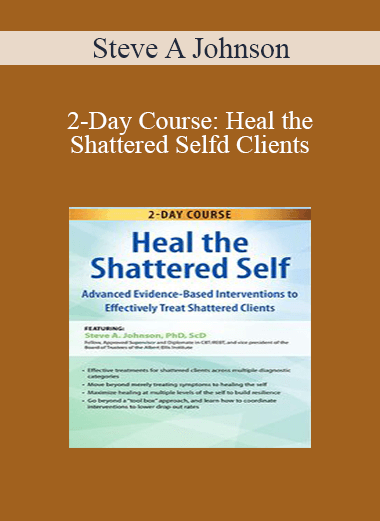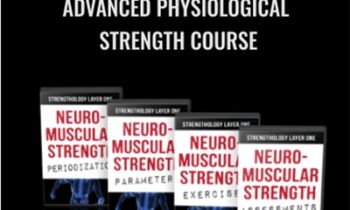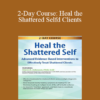$439.99 Original price was: $439.99.$78.00Current price is: $78.00.
 Purchase this course you will earn 78 Points worth of $7.80
Purchase this course you will earn 78 Points worth of $7.80Elevate your skills with the Steve A Johnson – 2-Day Course: Heal the Shattered Self: Advanced Evidence-Based Interventions to Effectively Treat Shattered Clients course, available for just $439.99 Original price was: $439.99.$78.00Current price is: $78.00. on Utralist.com! Browse our curated selection of over 60,000 downloadable digital courses across diverse Health and Medical. Benefit from expert-led, self-paced instruction and save over 80%. Start learning smarter today!
Salepage link: At HERE. Archive:
Total sizes: – include:
- Faculty:
- Steve A Johnson
- Duration:
- 12 Hours 1 Minutes
- Format:
- Audio and Video
- Copyright:
- Apr 25, 2019
Description
| Manual – 2-Day Course: Heal the Shattered Self: Advanced Evidence-Based Interventions to Effectively Treat Shattered Clients (4.3 MB) | 107 Pages | Available after Purchase |
Outline
The Shattered Self: Signs and Symptoms
- Stress and the defense cascade: freeze, flight, fight, fright, flag & faint
- Alterations in emotions, impulses, attention, consciousness, & memory, including autobiographical memory
- Physical symptoms
- Changes in perceptions of self, others, life, and the world
- Disruption of interpersonal relations
- Limitations to the research and potential risks
Assess the Shattered Self
- Neuroimaging, the default mode network, and the three senses of self
- Conduct an autobiographical narrative history
- Trauma-informed, culturally-informed, and gender-informed assessment
- Overcome client resistance during assessment
- Diagnostic instruments
Understand the Shattered Self
- Attachment styles
- Young’s Early Maladaptive Schema
- CBT Cognitive Conceptualization Diagram
- REBT Self-Help Form
- ACT Hexaflex Model
The Shattered Self and DSM-5® Diagnostic Categories
- Trauma disorders and adverse childhood events
- Mood disorders – the hopeless self
- Substance use disorders – numbing the self
- Complicated grief disorder – self without meaning
- Generalized anxiety disorder – the overwhelmed self
The Shattered Mind
- Challenging the five major damaged beliefs & 12 cognitive distortions
- 12 techniques to challenge dysfunctional self-schemas
- 14 techniques to reinterpret events
- Techniques to meet three needs and identify 12 personal strengths
- Behavioral intervention to act “as if” the ideal self has been created
Reach the Shattered Self in Therapy
- Address the interaction of the three senses of self & the default mode network
- Defuse the self from self as conceptualized and self from roles
- Calm the hyper-aroused self
- Resurrect the submerged self
- H.E.A.L. the self
Heal the Grieving Self
- Renarrating the “Hot” memory
- Use imagination to create a new self
- Safely holding the hyper-aroused self
- Four domains of creating safety
- Four steps to reconnect a grieving self
Creatively Heal the Shattered Self
- Creative writing
- Visual arts
- Progressive re-narrating the self
- Listening to the self
Tasks for the Shattered Self
- Task 1: establish safety, stabilize symptoms, and self-care
- Task 2: remember the trauma & transform the memory
- Task 3: create a multi-meaning narrative
- Task 4: reconnect with life
- Task 5: create the ideal self
The Distressed Self of the Therapist
- Identify the signs of caregiver distress
- Eight techniques to reverse caregiver burnout
- Six techniques to inoculate the self against caregiver burnout
Faculty
Steve A Johnson, Ph.D., ScD Related seminars and products: 1
Steve A. Johnson, Ph.D., ScD, is a Fellow, Approved Supervisor and Diplomate in CBT/REBT, and is the vice president of the Board of Trustees of the Albert Ellis Institute in New York City where he was mentored by Albert Ellis himself. He has lectured and presented hundreds of training workshops in the United States, Canada, Europe, the Middle East, and South East Asia on cross-cultural evidence-based treatments for severe PTSD and how to integrate spirituality into psychotherapy for clients for whom spirituality or religiosity is relevant.
He has begun offering workshops for the U.S. military on the latest treatments for trauma. He is a full-time professor, directs a graduate counseling program, and conducts research on integrating spirituality into evidence-based treatment for anxiety, loneliness, depression and anger.
Dr. Johnson has been an active clinician since 1993 specializing in treating PTSD and co-occurring disorders, i.e., major depression and substance abuse. He is the founder of an affiliate training center of the Albert Ellis Institute in New England and in the process of establishing another affiliate in South Carolina. One of his academic interests, and the topic of a book he is authoring, is in the philosophical and psychotherapeutic theories of the self.
In his spare time, he offers pro bono treatment to Muslim refugees and immigrants to the United States who have PTSD. Dr. Johnson was honored with the NAMI Affiliate Recognition Award for dedication, support, and outstanding leadership on behalf of people with mental illness and their families.
Speaker Disclosures:
Financial: Steve Johnson is the founder and director for Connecticut Center for RE/CBT. He receives a speaking honorarium from PESI, Inc.
Non-financial: Steve Johnson is Vice President Board of Trustees for Albert Ellis Institute.
Cultivate continuous growth with the Steve A Johnson – 2-Day Course: Heal the Shattered Self: Advanced Evidence-Based Interventions to Effectively Treat Shattered Clients course at Utralist.com! Unlock lifetime access to premium digital content, meticulously designed for both career advancement and personal enrichment.
- Lifetime Access: Enjoy limitless access to your purchased courses.
- Exceptional Value: Benefit from savings up to 80% on high-quality courses.
- Secure Transactions: Your payments are always safe and protected.
- Practical Application: Gain real-world skills applicable to your goals.
- Instant Accessibility: Begin your learning journey immediately after buying.
- Device Compatible: Access your courses seamlessly on any device.
Transform your potential with Utralist.com!
| Status |
|---|
Related products
Health and Medical
“Male Physique Training Templates” – Renaissance Periodization
= 42 Points
Health and Medical
= 43 Points
Health and Medical
= 43 Points
Health and Medical
The Heart of Complex Cardiac Care: Strategies for Rapid Action – Marcia Gamaly, Robin Gilbert
= 85 Points
= 53 Points
Health and Medical
= 29 Points
Health and Medical
= 18 Points












